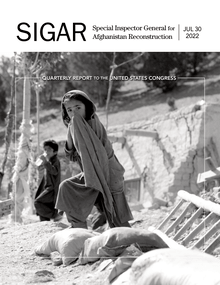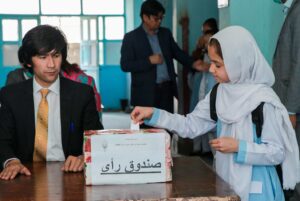Pashtana Rasool (below) was involved in spearheading democratic efforts in Afghanistan as the Executive Director of the Afghan Child Education and Care Organization or AFCECO, Una Hajdari
 “As long as the Taliban are in power, there is no change, there is no hope for the people in the country,” Pashtana remarks. “The Taliban has always had control in Afghanistan, even when we had presidents. But they were in villages, where they controlled everything, but in the cities, we had a lot of opportunities like schools for girls and everything.”
“As long as the Taliban are in power, there is no change, there is no hope for the people in the country,” Pashtana remarks. “The Taliban has always had control in Afghanistan, even when we had presidents. But they were in villages, where they controlled everything, but in the cities, we had a lot of opportunities like schools for girls and everything.”
Albania was one of the few countries in Europe to announce its intention to accept thousands of Afghan refugees, along with Kosovo and North Macedonia, Hajdari adds:
An increasingly popular tourist destination, it boasts a 450-kilometre coastline, historical attractions from the Roman, Greek, Byzantine and Ottoman periods, and lush mountain ranges, Placing the refugees at the most high-capacity locations in the country — the sprawling resorts that are packed in the summer — was a no-brainer, especially since the costs were covered by NGOs such as the National Endowment for Democracy (NED) ……
 A year of Taliban rule over Afghanistan has shown all too clearly that there are good reasons to debate the future level of aid to Afghanistan. The Taliban is an extreme ideological movement whose values are clearly opposed to those of both Western democracies and the mainstream of Islam, notes Anthony H. Cordesman, CSIS Emeritus Chair in Strategy.
A year of Taliban rule over Afghanistan has shown all too clearly that there are good reasons to debate the future level of aid to Afghanistan. The Taliban is an extreme ideological movement whose values are clearly opposed to those of both Western democracies and the mainstream of Islam, notes Anthony H. Cordesman, CSIS Emeritus Chair in Strategy.
So far, the Taliban has only created the shell of a replacement government, and has steadily
increase a system of state control that enforces an ideology is based on religious extremism which affects every aspect of security, economic and business, and ordinary life, he writes in Setting the Right Conditions for Aid to Afghanistan – and Other Nations As Well, drawing on key sources like the UN, World Bank, and SIGAR:
Its extremism and links to terrorism create major problems for secular governments and democracies and raises serious questions as to whether continuing anything approaching past aid levels can do more than support extremism and the Taliban, and how aid will actually be allocated and used. All of these problems will be compounded if the U.S. supports short term humanitarian aid without reaching some agreement with the Taliban and other donors that will address Afghanistan’s need for more effectiveness governance, financial systems, and development. RTWT
On the outskirts of Kabul, Afghanistan, the Marefat High School (above) opened in 2002 to provide civic education to Afghan children, regardless of gender or ethnicity, adds the National Endowment for Democracy (NED). When the Taliban took over in 2021, and banned girls from secondary school, Marefat High School had to rethink education.
Since the Taliban took control, Afghans dedicated to a democratic future have faced a new level of danger, as the regime targets civil society leaders, advocates of women’s rights, journalists, artists, and other activists, including NED partners.
 “It’s personal,” said NED President and CEO Damon Wilson. “NED has provided support for hundreds of civil society groups and human rights defenders in Afghanistan since 1984, NED’s first year in existence. Given these relationships, we could not sit back and watch this crisis unfold without doing everything possible to help our partners.”
“It’s personal,” said NED President and CEO Damon Wilson. “NED has provided support for hundreds of civil society groups and human rights defenders in Afghanistan since 1984, NED’s first year in existence. Given these relationships, we could not sit back and watch this crisis unfold without doing everything possible to help our partners.”
Meyhen yetimhanesi yetkililerinden Sn. Pashtana RASOOL ve Rohia PASOON’u Ofisimizde misafir ettik. Yetim çocuklar için yapılabilecek projeler hakkında görüş alışverişinde bulunduk. pic.twitter.com/txHJqFeDuM
— TİKA Kabil (@KabilPko) October 24, 2019







